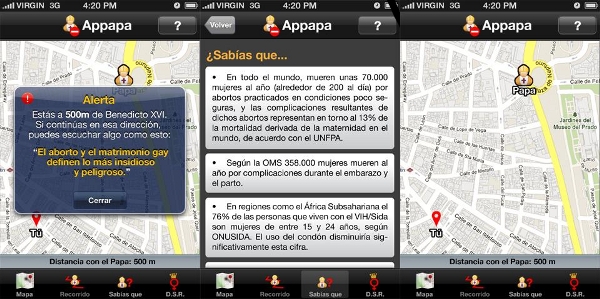Appapa: When Geolocation Becomes a Tool for Political Activism
Millions of people gathered last August in the main avenues of Madrid to see Benedict XVI in the World Youth Day (WYD), but at the same time his visit was the center of a political controversy concerning its economical costs and the Pope’s remarks on social issues like abortion or gay marriage. The massive protest rallies held in the city during these days were a proof of the steady growth of political activism in Spain during 2011, but this event could also be used to study the importance of new media for political activism from a new perspective. I will use the Appapa application to exemplify this idea.
I would not be lying if I say that this application was useful to know where Benedict XVI was in every moment during these days, but I would not be saying the whole truth, as it was not intended for WYD attendants. Let’s better use the words from its own website (translation is mine, as there is no English version available):
Appapa is an application that alerts you when you are 500m or less from the Pope, so you will not have to listen to his remarks on abortion. But above this, we have created it to promote reproductive and sexual rights as an integral part of human rights. Help us spreading it!
The first intention of Appapa was, as their creators indicate, raising awareness of some specific social issues. This application was developed by Solidaridad Internacional, a “non confessional, progressive and independent” NGO created in 1986 (although it receives a 90% of its €10m incomes via public subventions from different Spanish administrations). It runs educational and health programs, mainly in the areas of sexual health and reproductive rights in 20 countries across Latin America, Africa and the Middle East, according to its website.
The graphic interface shows a menu with four options, beside the alarm system included in the application. The first one is a Google map indicating the exact location of the user and the Pope. The second option is a timetable with all the public appearances of Benedict XVI in Madrid. There is also a “Did you know?” section with facts related to sexually transmitted diseases, genital mutilation, homosexuality, or hate crimes. The last part of the application offers a list of reproductive and sexual rights.
Geolocation is the main feature of Appapa, as it is utterly needed to alert about the distance between the user and the Pope. Despite all the concerns about privacy and intimacy rights made by individual freedoms advocates regarding this technology (“They know where you are at every single moment”), it is not odd to define the GPS system as a subversive agent in this particular case. This application reverses this ‘surveillance and control’ method by appropriating the technology, turning it into a useful tool for political activism. The Department of Defense of the United States would have never imagined that its toy could be used this way.
This is not the only appropriation act that makes of Appapa an interesting example for political activists. It also uses marketing methods in a creative way. Many private societies used the WYD to start commercial campaigns, even the most peculiar ones: a cellulose company manufactured a special edition of its best toilet paper in yellow and white colours, a marketing effect using the flag of the Vatican City as an excuse to get media coverage and promote their brand. Why shouldn’t a NGO make an appropriation of these tactics in their own interest? Experience in private companies has shown their effectiveness. Like in the hygienic paper example, the Pope can be seen in Appapa as a mean, a necessary actor, used to raise awareness about some specific interest –social issues, in this case.
The application was a whole success if we consider it as part of a marketing strategy. The number of downloads of Appapa in the Android Market was very low (between 500 and 1,000) but media impact was much bigger: more than 3,000 Likes in Facebook, hundreds of blog posts and articles in newspapers… The video was also helpful spreading the message: more than 20.000 views only in Youtube.
The use of new media by the Left movements and their relationship has been matter for an intense literature, from Walter Benjamin to Donna Haraway, not to forget the historical debate between Hans Magnus Enzensberger and Jean Baudrillard concerning May of 1968. In a more contemporary and practical approach, the arab uprisings, the Anonymous collective, or even the #spanishrevolution movement, serve as study cases in recent academic research about the role of communication technologies in social issues. Given this context, the case of Appapa offers all the new elements indicated above and could be studied as an example of new appropriation tactics for political activism.
